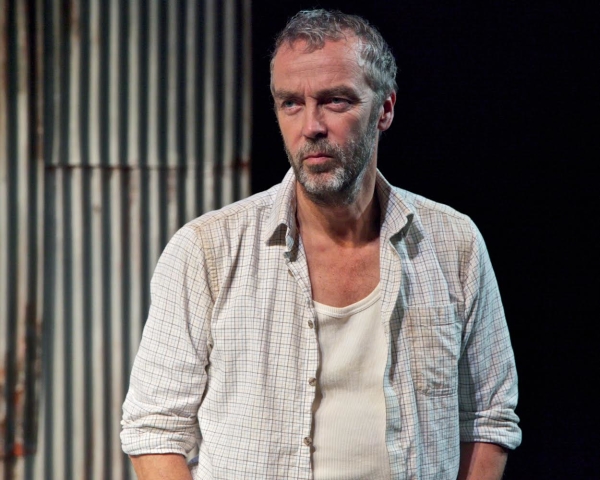Uncle Vanya (St James Theatre)

© Francis Loney
Although we’re in rural England, Chekhov’s original names are retained. Before ten minutes are up there have been coy references to mobile phones, websites, iPads and speed cameras, yet the tone of the adaptation remains moodily Russian and nothing much is added or notably refreshed in the retelling. The restless liaisons, bored philosophising and crushing world-weariness of these flawed characters define their existence as they always do.
Russell Bolam‘s production, the second in the admirable One Stage season, is richly detailed, obedient to Chekhov’s comic intentions (he opens the show with a neat sight gag for Dr Astrov) and attentive – within designer Janet Bird‘s adaptable corrugated iron set – to the crucial ebb and flow of relationships between the eight characters.
John Hannah lives up to his above-the-title billing as a searing Vanya. He slow-cooks his performance during the first two acts in a masterclass of free-flow acting, then lets rip at Jack Shepherd‘s bewildered Serebryakov with a savagery that’s as frightening as it funny. He cuts a tragic figure, to be sure, yet isn't afraid to be unsympathetic.
'The players superbly convey their vacillating emotions'
At the play’s heart, though, are two tortured young women. Rebecca Night‘s Yelena and Amanda Hale‘s self-lacerating Sonya, both of whom are beset by passions, requited or otherwise, with second-rate men. The players superbly convey their respective characters’ vacillating emotions: each is at once touching, vulnerable, thwarted and infuriating. They share one beautifully realised scene (on a sofa) in which their emotional highs and lows are revealed less by what they say than through the restlessness of their physical behaviour.
Astrov is the play’s alpha-male, dominant in the household, irresistible to the women and blessed with the lion’s share of Chekhov’s lines, and Joe Dixon eats up the limelight in a performance that occasionally seems too big for the company he’s in – as though Jeremy Clarkson had stepped into Emmerdale. But he shares some quirkily entertaining moments with Amanda Boxer‘s befogged old Marina and brings relish to his depiction of the self-satisfied doctor’s faux-sunny, substance-fuelled disposition.
Chekhov’s subtle rhythms and fast-changing moods can find out lesser directors, and certainly lesser actors. Pitch them wrongly and productions of his plays can easily appear overheated or, conversely, over-analytical. This Uncle Vanya, in true 'Three Bears' fashion, is just right.










